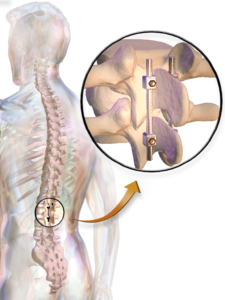The What, Why and How of Lumbar Spinal Fusion Surgery
Over 85% of our patients here at Saratoga Spine do not need surgery. However, if NSAID’s, exercise, physical therapy and other treatments are not offering a patient relief, surgery may be recommended. In this article we’ll review one such surgical treatment option, Lumbar Spinal Fusion Surgery.
Why Do you Need a Lumbar Spinal Fusion?
Spinal fusion surgery is just one surgical treatment option doctors can utilize to treat back problems. But, it’s not for everyone.
Lumbar spinal fusion may be recommended if you have1,2:
- scoliosis
- spondylolisthesis
- abnormal or excessive motion between vertebrae such as in severe arthritis
- broken vertebrae or a fracture in your spine
What is Spinal Fusion Surgery?
Spinal fusion surgery is a procedure in which vertebrae are biologically welded together. Since the vertebrae are fused (or joined) together the motion between them is eliminated. It also reduces the stretching of nerves, ligaments and muscles in the area3.
How is a Lumbar Spinal Fusion Done?

To fuse the bones together during a spinal fusion the surgeon, will place bone graft material between the bones they want to fuse. The bone graft may be taken from another part of your body, from a donor or may be synthetic. As your body heals from surgery this graft will help the bones grow together and “fuse”.
Often times, surgical implants such as rods and screws will be used to keep the vertebrae in position as they heal together4.
How Long Does it Take to Recover from a Spinal Fusion?
After surgery you’ll be encouraged to be mobile as quickly as possible. Physical therapy is usually required and patients may be prescribed medication for pain relief.
The bone may take a few months to fuse together and completely heal. During this time precautions are needed. Your doctor will discuss any limitations with you prior to surgery and post-operatively.
Risks of Lumbar Spinal Fusion Surgery
As with any surgery, spinal fusion surgery comes with inherent risks. There are risks associated with the anesthesia, incision, infection and potential failure of the process itself. Complications are rare, but possible.
As with any surgical procedure, if your doctor recommends spinal fusion surgery, ask them to fully explain the benefits and risks to ensure you understand the procedure before deciding if it’s right for you.
References
- Saratoga Spine
- MayoClinic
- Ortho Info
- WebMD
